- Home
- Q. Patrick
The Girl on the Gallows
The Girl on the Gallows Read online
The Girl On The Gallows
Edith Thompson and the Tragic Love Affair that Outraged a Nation
Q. Patrick
Part I: The Murder
Chapter One
“The deceased Percy Thompson was my nephew by marriage. From time to time I met him and his wife, the prisoner Thompson. On Tuesday, third October (1922), I met them both by arrangement at the Criterion Theatre; I think the arrangement was made by my wife about a week or a fortnight beforehand. After the performance was over we left Mr. and Mrs. Thompson at the Piccadilly Tube Station, about quarter to eleven o’clock. They were going to Liverpool Street and went down a different lift from what we did.… The party upon that particular evening to which I have spoken was an ordinary happy theatre party, and when Mr. and Mrs. Thompson left us at the tube station they appeared to be upon their usual terms.”
This is an extract from the statement given in court by Mrs. Edith Thompson’s uncle, Mr. John Ambrose Henry Laxton. It is interesting because it records the last glimpse anyone had of the Thompsons while they were still just Edie and Percy—still just another of London’s hundreds of thousands of commonplace, middle-class married couples.
The party had been to see the popular actor Cyril Maude in “The Dippers.” One can imagine the two husbands helping the two wives off with their coats in the red plush seats of the Upper Circle; one can imagine chocolates being munched, laughter ringing out, family gossip during the intermission. An ordinary happy theatre party.
To one who looks back, it is a little frightening, pointing up as it does the unpredictability of life, to think that someone in the theatre crowd almost certainly jostled against Mrs. Thompson without the faintest suspicion that she was to be the Mrs. Thompson. Perhaps Percy Thompson stooped and retrieved a program or a glove for someone. When he handed it to its owner, he would have looked just like anyone else. There would have been no visible sign of the doom so soon to overtake him.
“When Mr. and Mrs. Thompson left us at the tube station,” said Mr. Laxton, “they appeared to be upon their usual terms.”
What were the usual terms of the Thompsons? On the surface, they seemed to be the usual terms of almost anyone else in their walk of life. On the evening of that “ordinary theatre party,” Percy Thompson was thirty-two years old, his wife twenty-eight. They had been married eight years, were childless, and lived at 41 Kensington Gardens in the modest, rather drab London suburb of Ilford. Percy Thompson was employed as a shipping clerk in a city office where his painstaking, unimaginative temperament suited him to a safe, subordinate position. His wife also worked. She was both bookkeeper and manageress of the millinery firm of Carlton and Prior at 168 Aldersgate Street. She was highly considered in this job and earned slightly more than her husband—six pounds a week (the equivalent of thirty-five dollars in the States at that time).
The Thompsons had bought their house several years before, and the original owners, Mr. and Mrs. Lester, had stayed on as boarders. Mr. Lester had recently died and there remained only his widow, an elderly lady who “kept herself to herself” in her rented room. The Thompsons had no maid. Edith Thompson took care of the housekeeping after work. The Thompsons belonged in a class that, only three years after World War I, was still relatively new in England—the class of husband-wife commuters, a class that scarcely knew its neighbors, whose front and back gardens with their traditional laburnum and pink May trees got only spasmodic week-end attention, whose houses, in fact, were little more than dormitories.
To their circle of friends Percy Thompson had seemed what he was—a somewhat colorless individual. He had a weak heart that had kept him out of the war and which he was not above exploiting in a domestic crisis. He had the little man’s unadmitted resentment of his wife’s business success and, to compensate, made a point of being the Master of the House. He was vain, short-tempered, and had to be coaxed. He was the antithesis of “good fun.”
His wife, on the other hand, was definitely “good fun.” She was not beautiful, although later the newspapers were to make much use of this adjective in describing her. She was, however, unusual-looking. Her face was what the French call journalier, immensely changeable, dull or radiant, girlish or exotic, strange or commonplace, in a bewildering succession of moods.
Being in the fashion trade, she dressed with style and dash. She loved to dance; she bet small, occasional rash sums on the horses; as part of her job, she let an occasional buyer take her out to lunch or flirt with her over a glass of wine in a pub; she had, on occasion, a gusty, uninhibited laugh. But her healthy desire to enjoy life operated, it seemed, strictly within the still narrow and constricting limits of Ilford morality. She was stigmatized as neither “fast” nor “loose.”
Certainly, no one dreamed that behind her jolly, almost frivolous exterior there lurked an extraordinary, a terrifying inner life. Uncle Laxton, hurrying with his wife through the subway crowds toward their homeward train, would have been astounded if he had been told that, within a few days, his niece Edie would become the most talked-about woman in the English-speaking world.
“They went down a different lift from what we did,” he said.
They certainly did. It was a lift that went very far down and carried the Thompsons to a region that was dark and ominous indeed.
The train that the Thompsons took from Piccadilly Circus arrived at Ilford around midnight. Certainly the Thompsons went out of the station along with the little group of other returning theatregoers; certainly they started together on the longish walk to Kensington Gardens—and certainly, before they arrived at their destination, the crime that was to shock and later to elicit the compassion of the world took place at a dark spot on one of the intervening, abstemiously lit streets. But what happened during those few moments of violence, however much publicized by the newspapers, however shaped after the event by individual prejudice, can never be precisely known, because there were only two living witnesses to what occurred, and, since both of their lives depended upon their testimony, their versions cannot be considered impartial.
In the light of this fact, a clearer and fairer picture will be drawn if those crucial moments, for the time being, are left shrouded in their own darkness and the story is taken up a little later on through the consciousness of the first impartial person on whom it impinged.
This individual was a salesmanager called John Webber, who lived at 59 De Vere Gardens, a street that was close to the Thompsons’ home. At twelve-thirty Mr. Webber was just about to go to bed when he heard a woman’s voice on the street outside, calling in a most piteous manner, “Oh, don’t, don’t!” Mr. Webber was so impressed by the sense of disaster in the voice that he put on his clothes again and went out of his house to investigate.
He was not, however, the first person actually to see Mrs. Thompson. This role was allotted to a Miss Dora Finch Pittard and a Mr. Percy Edward Cleveley, a couple that had also been to the theatre that night and had returned to Ilford by the same train as the Thompsons. They had been walking at some distance behind the Thompsons when suddenly a woman came running toward them out of the darkness. This woman was Edith Thompson. When she saw them, she cried out with every indication of anguish, “Oh, God, will you help me? My husband is ill; he is bleeding.”
To Miss Pittard and Mr. Cleveley, Mrs. Thompson was clearly in a condition of hysteria and terror. When they asked her where her husband was, she managed to gasp:
“He’s on the pavement. Do you know a doctor? Do you know a doctor?”
They did know a Dr. Maudsley who lived nearby on Courtland Avenue. They took Mrs. Thompson to his house, but at the door she left them, running back to her husband.
Mr. Webber, now out on the street, was conscious of this
commotion. Seeing a match flicker down the dark street, he hurried toward its illumination. He found Mrs. Thompson crouched alone beside her husband, who was sitting propped against a wall. He asked Mrs. Thompson if her husband had had a fall. She sobbed that she did not know.
“Don’t touch him,” she cried. “Don’t touch him. A lady and gentleman have gone off for a doctor.”
Soon afterward Miss Pittard and Mr. Cleveley came up to the scene with Dr. Maudsley. They too asked Mrs. Thompson what had happened. All she could manage to say was:
“Oh, don’t ask me. I don’t know. Somebody flew past, and when I turned to speak to him blood was pouring out of his mouth.”
With the assistance of Mr. Webber, Dr. Maudsley examined Percy Thompson as best he could by matchlight. On feeling the pulse, he found that the man was dead. To the doctor, as to all the others, Mrs. Thompson seemed in a confused condition, hysterical and agitated. He asked her if her husband had been taken ill coming home in the train or coming along the road. She said:
“Oh, no.”
When he told her that her husband was dead, Mrs. Thompson cried out, again in anguish, “Why didn’t you come sooner and save him?”
The police had been summoned, and at one o’clock, Sergeant Mew and two constables arrived on the scene. The constables arranged the removal of the body to the Ilford Mortuary. Sergeant Mew took Mrs. Thompson home. On the way, Mrs. Thompson asked him:
“Will he come back?”
This bewildering question appeared to the Sergeant to have referred to her husband. He parried it with an awkward “Yes.” Mrs. Thompson then said:
“They will blame me for this.”
Meanwhile, the body of Percy Thompson was being examined at the mortuary. It was immediately obvious that he had been stabbed several times viciously about the head and neck. One of the knife blows, struck probably from behind, had severed his carotid artery.
Without any doubt, Percy Thompson had been murdered. Mrs. Thompson had been an actual eyewitness of the crime and yet her description of it had been, at best, incoherent. At three A.M. Sergeant Mew, with Sergeant Grimes, interviewed her at 41 Kensington Gardens. She was still wearing her theatre dress, spattered with blood from her feverish attempts to aid her husband.
Sergeant Grimes: “Can you explain to us what happened on the road home from the station?”
Edith Thompson: “I don’t know. I can’t say. I only know that my husband suddenly dropped down and screamed out, ‘Oh.’”
Sergeant Mew: “Can you account for the cuts on your husband’s neck?”
Edith Thompson: “No. We were walking along and my husband said, ‘Oh.’ I said, ‘Bear up,’ thinking he had one of his attacks. He then fell on me and walked a little further. Then he fell up against the wall and then on the ground.”
Edith Thompson insisted that neither she nor her husband had been carrying a knife and that she had noticed no one on the street. Why then had she said earlier to Miss Pittard, “Somebody flew past”? Why had she cried out in those piteous tones that had reached Mr. Webber in his bedroom; “Oh, don’t, don’t!” as if she had been pleading desperately with some quite visible assassin?
It was clear to the sergeants that Mrs. Thompson was not telling the truth. But the British police officer is notoriously a cautious and a kindly individual. The sergeants did not question her for long, nor did they try to trip her up. Fairly soon they departed from 41 Kensington Gardens and left Edith Thompson to get through the few remaining hours of the night as best she could.
She did not go to bed. She did not even change. The next morning at eleven o’clock, when an inspector arrived to question her once again, he found her still in the sitting room, still huddled in a chair, still wearing her now terrifying, bloodstained party dress.
Chapter Two
The inspector who came to question Mrs. Thompson at eleven o’clock on the morning of Wednesday, October fourth, was Richard Sellars, a divisional inspector of police, K Division. The Ilford police had already got in touch with Scotland Yard, and Superintendent Wensley, the chief of the Central Branch of the C.I.D., was coming in person to investigate the case. Inspector Sellars had instructions to bring Mrs, Thompson to the police station so that she could be “at hand” in case of any developments.
He found Mrs. Thompson attended by her mother, Mrs. William Graydon, who had hurried to her daughter’s side from her own suburban home a mile or two away at 231 Shakespeare Crescent, Manor Park. Mrs. Thompson had in no way recovered from her bewilderment and grief. Once again she was asked what had happened and once again she gave virtually the same answer she had given the night before.
As instructed, Inspector Sellars asked her to accompany him to the police station. Mrs. Graydon went with them. It was a dismal day. Rain was deluging down. The three of them walked to the station, where Superintendent Wensley was waiting to make Mrs. Thompson’s acquaintance.
There have been several memorable chiefs of the C.I.D. at Scotland Yard, and Wensley was one of them. Born in the west of England of fairly modest country stock, he had joined the London police force in 1885 and had by stubborn efficiency climbed to the very top of his profession. He was a great favorite with police inspectors, magistrates, and judges, from whom his carefulness and scrupulous honesty had won much praise. He had a high ideal of the detective’s role as an instrument of justice, and he had put this ideal into practice. A detective’s function, he felt, was to find out the exact truth. He had nothing but contempt for any ingenious police device to trick or trap suspects. And perhaps with an unconscious vanity, he was apt to believe that no one except himself could be completely relied upon to be the “ideal detective.”
That was why he had come in person to Ilford. A man had been struck down in the dark. There seemed to be no motive, no suspect, no trace even of a weapon. The very sketchiness of the evidence indicated that the murder on Belgrave Road required the ideal detective’s personal touch.
Mrs. Thompson was not under arrest. She was settled with her mother in the matron’s room at the police station, and soon Superintendent Wensley joined her.
People have described the Superintendent’s attitude as “disarmingly casual” and his manner as “friendly, almost avuncular.” There is no record of Mrs. Thompson’s reaction to him, but Superintendent Wensley has recorded in his autobiography his own first impression of Mrs. Thompson:
“She could scarcely have been called a pretty woman, but she had a distinctly attractive personality. She carried herself well, dressed tastefully—she still wore the evening gown in which she had gone to the theatre—and spoke with an air of culture. In moments of animation she must have been a woman of considerable fascination. Even seeing her as I did at this original interview when she was under great stress of mind, she impressed me as being normally a woman above the average in intelligence … There was no doubt that her distress was genuine.”
It is evident from this quotation that Superintendent Wensley was busy being impartial. He even claimed that, at the first meeting, no real suspicion of Mrs. Thompson had crossed his mind. Since she had already made statements of marked inconsistency, this seems to have been carrying impartiality rather far.
But with the full power of the law behind him, Superintendent Wensley could afford to go on being ideal for some time. In his interview with Mrs. Thompson, he covered the ground already covered by lesser detectives and proceeded no further.
“I obtained the bare facts of the incident of the night immediately before the murder, but there we stuck.”
The interview came to an inconclusive end and Mrs. Thompson was left alone again in the matron’s room with her mother, where arrangements were made for the two ladies to spend the night.
Superintendent Wensley, who had not yet struck oil, went prospecting for it among the Thompsons’ relatives. The little, apparently harmless facts of the Thompsons’ lives emerged from a succession of interviews. When Percy’s brother Richard was questioned, he happened to refer to
a young boarder who had lived for several weeks in the Thompson house the year before. The boarder’s name was Frederick Bywaters. Richard Thompson saw no reason to connect Bywaters with the crime, for he was a ship’s clerk and presumably away at sea. But he did mention the fact that Bywaters had been on very friendly terms with Edith Thompson. He even made the remark: “I never could understand how Percy tolerated the situation.”
Was this perhaps oil? Wensley immediately questioned Mrs. Thompson and her mother about Frederick Bywaters. From them, after some hesitation, he learned that Bywaters wasn’t at sea at all. He had, in fact, spent part of the evening before at the Graydons’ house in Shakespeare Crescent, Manor Park.
Wensley acted with speed. Flying squads and local C.I.D. staffs were alerted to pick up Bywaters. This did not take long, for Bywaters was seen around six-forty-five P.M. to enter The Graydons’ house at Manor Park. Two policemen followed him in and asked him to accompany them to the Ilford police station.
Frederick Bywaters was a strikingly handsome twenty-year-old boy with a full lower lip, vigorous curly fair hair, and a habit of watching enigmatically behind half-lowered lashes. His father had been killed in the war and he lived with his widowed mother, who managed to support herself by means of a small millinery concern. He had gone to school with Edith Thompson’s younger brothers; had been for some years an intimate of the Graydon family, and, at the time of the crime, was supposedly beauing Edith’s younger sister, Avis. He was employed as a ship’s writer, a clerical job, by the P. and O. Steamship Company. He had made several voyages with the company, had a very good record with them, and, in fact, was highly thought of by everybody, including a worshiping mother and sisters.
The first thing Frederick Bywaters did when he entered the C.I.D. office at Ilford, where Superintendent Wensley was waiting for him, was to take off his overcoat and hang it up. Wensley immediately noticed spots on the sleeve that could have been blood. The coat was spirited away to the police surgeon, who, while Bywaters was being questioned, made a rough test of the spots and discovered that they were indeed bloodstains, although whether the blood was human or animal could not be ascertained at such short notice.

 Death Goes to School
Death Goes to School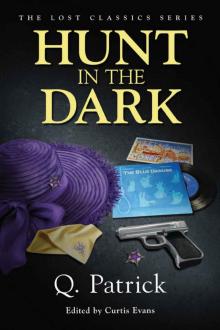 Hunt in the Dark
Hunt in the Dark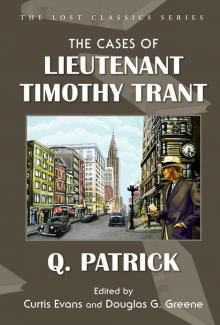 The Cases of Lieutenant Timothy Trant (Lost Classics)
The Cases of Lieutenant Timothy Trant (Lost Classics)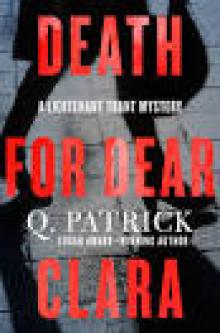 Death for Dear Clara
Death for Dear Clara S.S. Murder
S.S. Murder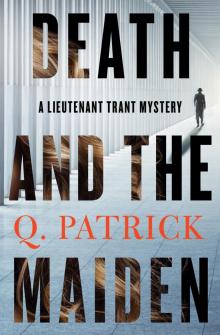 Death and the Maiden
Death and the Maiden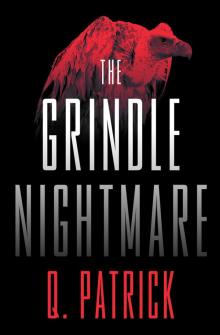 The Grindle Nightmare
The Grindle Nightmare Cottage Sinister
Cottage Sinister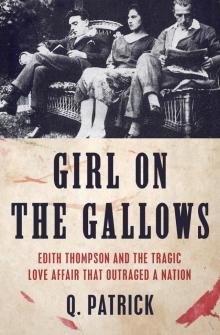 The Girl on the Gallows
The Girl on the Gallows